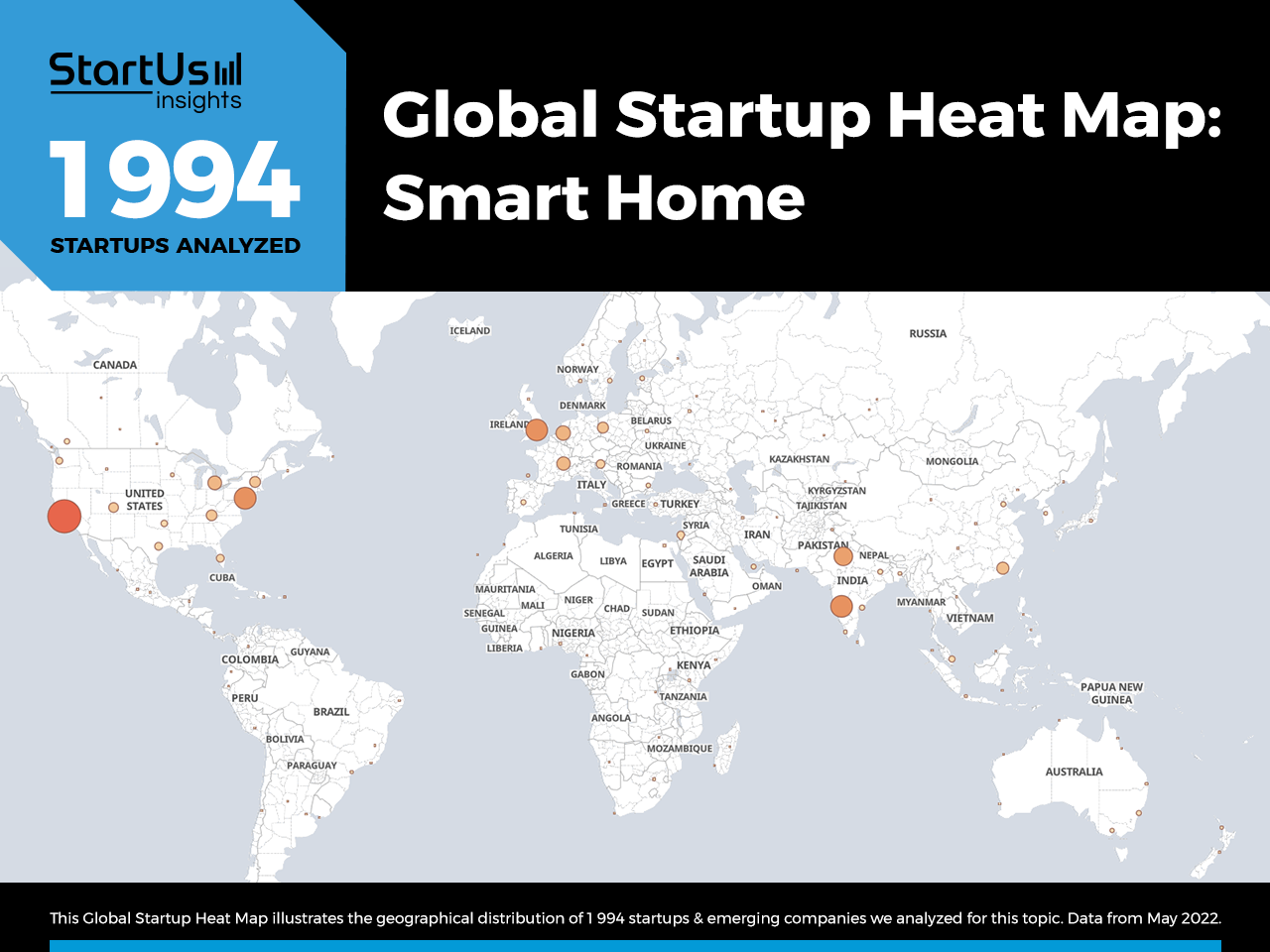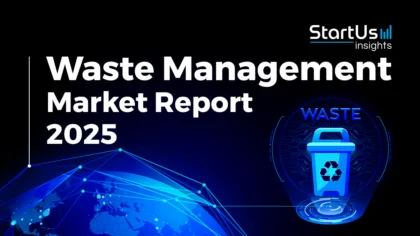Accelerate Productivity in 2025
Reignite Growth Despite the Global Slowdown
The smart home industry is transitioning towards automation and digitalization. Automated homes of today have an entire ecosystem of connected devices. Connected home startups and scaleups are developing solutions aimed at providing homeowners with the best home experience while maintaining safety. Smart home connectivity, smart home security, personalized health management, and next-generation entertainment are some major smart home trends. Many smart home owners are also integrating robotics into their daily lives to automate mundane tasks. Many smart home trends are in the development process and are witnessing rapid innovation.
This article was last updated in July 2024.
Innovation Map outlines the Top 9 Smart Home Trends & 18 Promising Startups
For this in-depth research on the Top 9 Trends & Startups, we analyzed a sample of 1 994 global startups and scaleups. The result of this research is data-driven innovation intelligence that improves strategic decision-making by giving you an overview of emerging technologies & startups in the smart home industry. These insights are derived by working with our Big Data & Artificial Intelligence-powered StartUs Insights Discovery Platform, covering 4.7M+ startups & scaleups globally. As the world’s largest resource for data on emerging companies, the SaaS platform enables you to identify relevant startups, emerging technologies & future industry trends quickly & exhaustively.
In the Innovation Map below, you get an overview of the Top 9 Smart Home Trends & Innovations that impact smart home companies worldwide. Moreover, the Smart Home Innovation Map reveals 18 hand-picked startups, all working on emerging technologies that advance their field.
Top 9 Smart Home Industry Trends
- Smart Home Connectivity
- Smart Inhouse Security
- Personalized Health Management
- Smart Home Heating
- Next Generation Entertainment
- Advanced Lighting
- Intelligent Energy Management
- Sustainable Home
- Home Robotics
Want to explore all Smart Home innovations & trends?
Tree Map reveals the Impact of the Top 9 Smart Home Trends
Based on the Smart Home Innovation Map, the Tree Map below illustrates the top 9 Smart Home Trends in 2025. Startups are developing technological solutions to improve the experience of homeowners. Smart home connectivity is a major trend within smart homes, which enables devices to become intelligent and act within an entire ecosystem. Another trend is in-house security to prevent burglars. The next spot is taken by personalized health management for better care of residents’ health. Smart home heating ensures efficient energy usage for heating, whereas next-generation entertainment technologies keep them entertained. Other smart home trends include advanced lighting, intelligent energy management, robotics, and sustainable home solutions.
Global Startup Heat Map covers 1 994 Smart Home Startups & Scaleups
The Global Startup Heat Map below highlights the global distribution of the 1 994 exemplary startups & scaleups that we analyzed for this research. Created through the StartUs Insights Discovery Platform, the Heat Map reveals that the US is the biggest hub for smart home technologies followed by the UK and the rest of Europe.
Below, you get to meet 18 out of these 1 994 promising startups & scaleups as well as the solutions they develop. These 18 startups are hand-picked based on criteria such as founding year, location, funding raised, and more. Depending on your specific needs, your top picks might look entirely different.
Top 9 Smart Home Trends in 2025
1. Smart Home Connectivity
Communication between smart home devices is critical for intelligent home control and operation. Wireless communication establishes a network of in-home devices, converting the regular home into a connected one. With communication networking technologies, smart home appliances work together automatically and act like an entire ecosystem. To achieve this, startups provide various controllable solutions, including wireless mesh networking, communication technologies, and wireless protocols.
SPARK develops Wireless Transceivers
Canadian startup SPARK develops a high bandwidth wireless protocol with ultra-low power consumption and ultra-low latency. This supports demanding applications like wireless VR and IoT. These technologies are essential for intelligent home operations. SPARKS’s technology significantly extends the battery life of electronics and enables the battery-less operation of wireless devices such as sensors when paired with energy harvesting technologies used in smart homes.
U-Linc offers a Connected Devices Protocol
UK-based startup U-Linc offers a discovery and interaction protocol that interacts with any connectable device, facilitating a level of interoperability. For residential space automation, it provides secure connectivity with different IoT devices without vendors. The startup’s technology enables a connected product to customize the user experience on the fly and to provide various access rights for monitoring and control of the home attributes, such as lighting, heating, and appliances.
2. Smart Inhouse Security
With increased automation and connectivity technologies, smart homes face new security challenges. Smart inhouse security solutions use smart sensors and smart surveillance to prevent burglaries. Startups are developing motion, contact, and fire sensors as well as presence detectors. Due to connected devices in smart homes, cybersecurity is an integral part of the smart inhouse security trend. These technologies help homeowners to be confident that their home is protected from outside and online interventions.
DEN develops Smart Door Locks
DEN is a Dutch startup that develops a wireless, communicating door strike. With the use of smart home connectivity technologies it communicates with other smart devices in the home ecosystem. It leverages Bluetooth Low Energy (BLE) and Z-Wave wireless technologies for connectivity. The locks can be controlled remotely with a mobile app. This lets homeowners provide access to others at specific times and receive real-time notifications with home access history.
Mitipi advances Home Security
Swiss startup Mitipi develops Kevin, an AI-based virtual guard that simulates human presence when nobody is at home. It uses realistic lighting effects and pre-programmed noises to simulate various everyday activities such as watching TV or vacuuming and includes a shadow projecting feature. It uses geofencing technology that activates automatically when the homeowner leaves the apartment. The startup’s solution also features a smoke detector, a motion detector, an alert system, and air quality analysis.
3. Personalized Health Management
Within the healthcare industry, there is a growing development of products focused on individual human health. To this end, personalized health management incorporates a range of innovative technologies to deliver care at home. Some of these technologies include health monitoring, sleep tech, smart pet care, and smart health appliances. Smart health monitoring enables emergency detection, illness diagnosis, and fall detection, applications that particularly help senior or chronic disease patients. Another technology that boosts personalized health management is sleep tech. Focusing on improving the sleep experience, smart appliances were developed for health conditions tracking and improving sleeping habits. Touchless technologies provide an ability for operating without physical contact and have innovations like touchless floor cleaning, touchless hand sanitizing, and touchless doorbells.
Gense offers a Home-Based Health Monitoring
Chinese startup Gense offers an affordable and portable self-help medical imaging device. It enables in-depth health monitoring, tracking, and preventive screening at home without medical training. The device targets early detection and chronic disease management for liver, lungs, heart, and musculoskeletal diseases. It uses screening technology that scans vital body organs like lungs, liver, and kidneys for early signs of health risk monitoring.
Cava develops a Health-Tracking Toilet
US-based startup Cava develops a health-tracking toilet seat. It tracks a broad range of health measurements, including gut health, heart health, hygiene, and fitness. It provides a daily waste analysis and smart food diary with diet and nutrition recommendations. Additionally, the seat has a daily blood pressure check-up, EKG, and base heart rate monitoring function. The startup’s app gives access to real-time data to allow users to optimize their lifestyles and achieve health goals.
4. Smart Home Heating
Due to the constant need to maintain the house at a comfortable temperature, efficient heat management of the living space is a top priority for homeowners. New smart home heating technologies allow intelligent and selective heating, eliminating the need of warming the whole house. There is an emphasis on greener alternatives as well as saving energy and money while reducing emissions. Programmable thermostats let users control and automatically schedule the room temperature. Other smart home heating devices include heat pump systems and smart water heaters.
iHelios provides Energy-efficient Infrared Heating
iHelios, a UK-based startup offers heating technology and property control systems. It provides an alternative to traditional gas central heating systems. The startup’s infrared heating technology, iHelios Reflective Insulation, is installed in ceilings or floors. iHelios is decentralized, allowing independent control in each room through its smart app. It also manages lighting, safety, security, energy consumption analysis, and fault alerts. Further, its iHelios Smart ZigBee Thermostat integrates with Alexa and Google Home.
syndii offers Temperature Sensors
Canadian startup syndii provides smart home monitoring through a system that utilizes radio frequency identification (RFID) to connect with wireless water and temperature sensors. This solution detects leaks, extreme temperatures, and power outages, sending notifications via cellular and email. It works without internet access and remains online leveraging cellular technology. Further, its backup battery ensures continuous operation during power cuts.
5. Next Generation Entertainment
Many smart home technologies are customizable to fit the homeowners’ needs. Next generation entertainment, including smart home customization and intelligent entertainment systems, is another major smart home trend. To provide the ability for customized living spaces were developed AI and AR-based furniture reconfigurable materials. Reconfigurable furniture materials based on artificial intelligence and augmented reality have been developed to enable the individual design of living spaces. Smart cushions and furniture change color, fabric, and texture using augmented reality. The next-generation gaming is providing another level of inhouse entertainment experience. IoT video streaming, mood-sensing music, and virtual interactive displays are a part of the entertainment ecosystem that strives to help homeowners relax and have fun in their free time.
MirroCool develops a Smart Mirror Assistant
US-based startup MirroCool develops a smart mirror that functions as a personal assistant and syncs with the user’s mobile phone. It includes a built-in HD camera that recognizes the face of the registered profiles. While looking like an ordinary mirror, it displays the current date and time as well as traffic information to the planned destinations as well as notifies about upcoming meetings and events from the user’s calendar. Moreover, the smart mirror detects motions, takes pictures of intruders, and sends them to the owner.
Smart Ohm offers Smart Home Entertainment
US startup Smart Ohm provides smart home entertainment solutions. It offers audio and video technology that allows control of the lighting, TV, audio, dimming, and curtains. Smart Ohm’s multi-room audio system connects multiple rooms for a streaming experience. It also designs dedicated music rooms with acoustics for music enthusiasts. Further, Smart Ohm delivers immersive home theater solutions, integrating with its automation system.
6. Advanced Lighting
Advanced lighting solutions allow customizing light according to the preferences and controlling it remotely, eliminating the need for traditional wall switches. Intelligent lighting provides the extent of the functionality of traditional home lighting, by giving over it automatic or wireless control with the phone or smart assistant. Compared to traditional lighting solutions, advanced lighting solutions are energy efficient, generating less heat and consuming less energy. AI-powered lighting allows customizing light scenes to create an atmosphere for any occasion, change the mood of the occupant and increase the productivity of study or work.
Stak offers Customizable Smart Bulbs
Japanese startup Stak offers customizable automated smart bulbs. In addition to lighting, it features add-ons such as a charger, sensor, camera, deodorizer, and bug repeller to provide a personalized experience. The startup’s smart lighting automation solution enables full control of light and air conditioning at home using voice control or an app. This allows remotely programming location and time settings according to user preferences. Moreover, it provides business intelligence across all devices to gain insights for energy savings.
EZVALO develops Multifunctional Lamps
Chinese startup EZVALO offers advanced home lighting solutions. The startup’s series of smart lighting devices are multifunctional and include a Bluetooth speaker, a wireless phone charger, and a music player and are controllable using a smart app or voice. It develops a motion-sensing rechargeable wireless light designed for indoor dark area illumination. Moreover, by using LED technology, the startup’s solutions save energy, while providing a variety of conveniences for homeowners built into the lamp.
7. Intelligent Energy Management
The use of multiple connected home devices and other appliances often results in high energy consumption. To avoid this, smart energy management ecosystems control and automate energy usage. Energy management appliances improve energy consumption and storage efficiency. For example, load monitors, smart energy meters, energy portals, and decision support tools improve intelligent energy management. These appliances process collected information and provide an overview of the current consumption, share insights and make predictions, suggesting the optimal energy distribution at homes.
Emporia facilitates Energy Consumption Management
Emporia is a US-based startup working on innovative technologies for smart home energy management. It develops a system that identifies and manages wasted energy to reduce energy consumption as well as controls energy use throughout the day. The startup’s system is controllable via a mobile app or the web and automatically adjusts the energy usage during the increased energy consumption. It provides energy use analysis and actionable recommendations that help homeowners save money, conserve energy, and reduce emissions.
Moduly offers Energy Storage Optimization
Canadian startup Moduly develops a modular home kit for energy storage. It includes a modular main control unit and two magnetic lithium-ion battery modules, which can be expanded according to energy needs. Moreover, the startup provides an intelligent app that provides energy consumption analytics with recommendations and predictions for homeowners. Using Moduly’s solution for backup power reduces the risk of interruption and improves the energy resilience of buildings.
8. Sustainable Home
With consumers increasingly opting for sustainable lifestyles, initiatives to reduce emissions are also making their way to homes. Smart homes are adopting advanced technologies to improve sustainability. Some of these innovations include the use of renewable energy, sustainable materials, and rethinking water storage and conservation. With the incorporation of renewable energy through photovoltaic cells, solar hot water harvesting, and energy harvesting, homes have access to sustainable energy. Rainwater harvesting systems and intelligent irrigation systems contribute to the more efficient use of water.
CloudRain offers Smart Garden Irrigation
German startup CloudRain advances centralized smart garden irrigation. It controls up to 5 wireless powered by solar energy valves. The startup’S technology automatically schedules custom watering timings for plants. Additionally, its smart algorithms factor in environmental conditions like sunlight, temperature, humidity, and wind to find optimal watering times.
Shunya develops Smart Solar Panels
Indian startup Shunya offers smart solar panels with a monitoring system. The startup’s system, Shunya Care, tracks performance data and generates a complete solar power plant at the micro-panel level. Based on real-time data, it optimizes energy generation to ensure peak efficiency without breakdown. This allows homeowners to bring their emissions as well as their energy bills down to zero and keep them there all the time.
9. Home Robotics
Robots automate tasks, turning ordinary homes into smart homes. Technologies such as artificial intelligence, the internet of things (IoT), and laser mapping technology, allow robots to act in the real-world environment, pick, move objects, and recognize and clean around household obstacles. Advanced robots are replacing common household tasks like cooking, cleaning, washing, vacuuming, watering plants, and feeding pets. Humanoids or robots that look and act like humans, have object detection and speech recognition functions, and assist and protect homeowners.
Sunny develops a Robot Assistant
US-based startup Sunny offers an AI-powered robot assistant that self-educates itself. The robot has several features such as face-to-face conversation, connection with smart home devices, performs personal data of the owner’s analysis, and provides entertainment. The robot performs mentioned functions with the use of computer vision, sensors, and cloud computing. It finds It can be configurable for applications in homes, businesses, or industrial setups.
Coral Robots builds a Robot Vacuum Cleaner
US-based startup Coral Robots develops a robot vacuum cleaner. It leverages computer vision navigation, allergen protection filters, and smart sensors to provide a deep home cleaning experience. The startup has developed a wheel system for robots that allows them to climb various surfaces and overcome obstacles. In addition, robots have a long-lasting batteries, allowing them to clean large living spaces. While traditional vacuum cleaners take care of the floor, the startup’s robots clean between sofa cushions and hard-to-reach corners, removing allergens and making it easier to breathe.
Discover all Smart Home Trends, Technologies & Startups
Startups are developing new technologies to take home automation to the next level. Advanced lighting, personalized health management, next generation entertainment, and robotics are working to tailor the smart home to homeowner preferences and create the most comfortable living space possible. Connectivity enables the integration of new technologies such as artificial intelligence, virtual reality, IoT, big data, and advanced appliances, making the ordinary home intelligent. Smart home security keeps homeowners and embedded technology safe. Smart energy management, sustainable home, and smart home heating aim to reduce emissions and consumption expenses. These solutions complement each other to create an intelligent, connected home.
The Smart Home Trends & Startups outlined in this report only scratch the surface of trends that we identified during our data-driven innovation and startup scouting process. Among others, touchless technology, smart thermostats, and advanced privacy features will transform the sector as we know it today. Identifying new opportunities and emerging technologies to implement into your business goes a long way in gaining a competitive advantage. Get in touch to easily and exhaustively scout startups, technologies & trends that matter to you!


 WATCH THE VIDEO VERSION
WATCH THE VIDEO VERSION 




![Explore the 10 Emerging Smart City Trends [2025-2026]](https://www.startus-insights.com/wp-content/uploads/2025/06/Smart-City-Trends-SharedImg-StartUs-Insights-noresize-420x236.webp)




